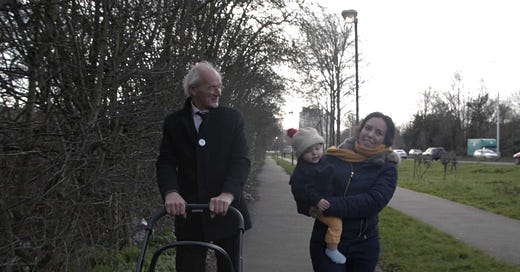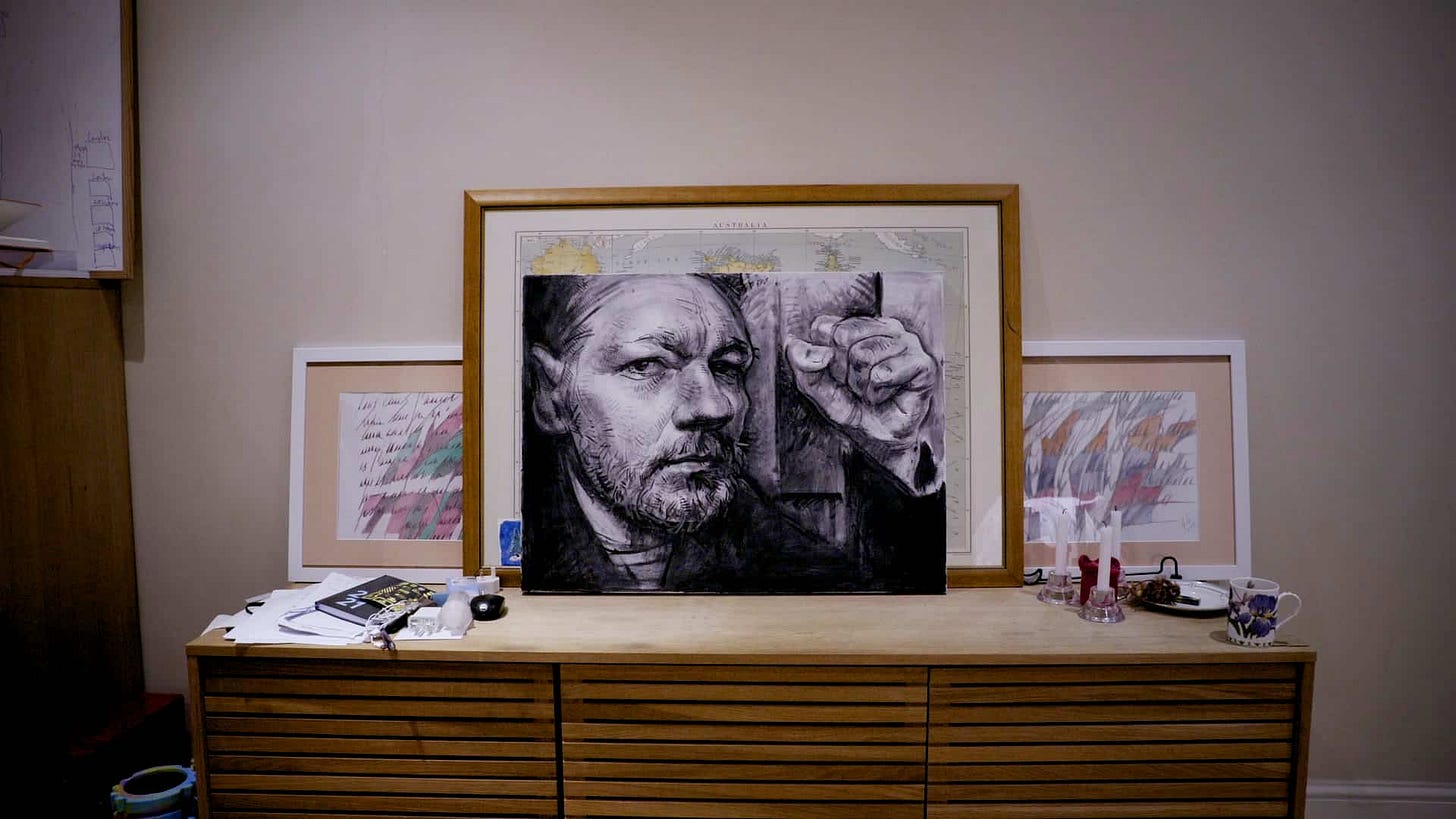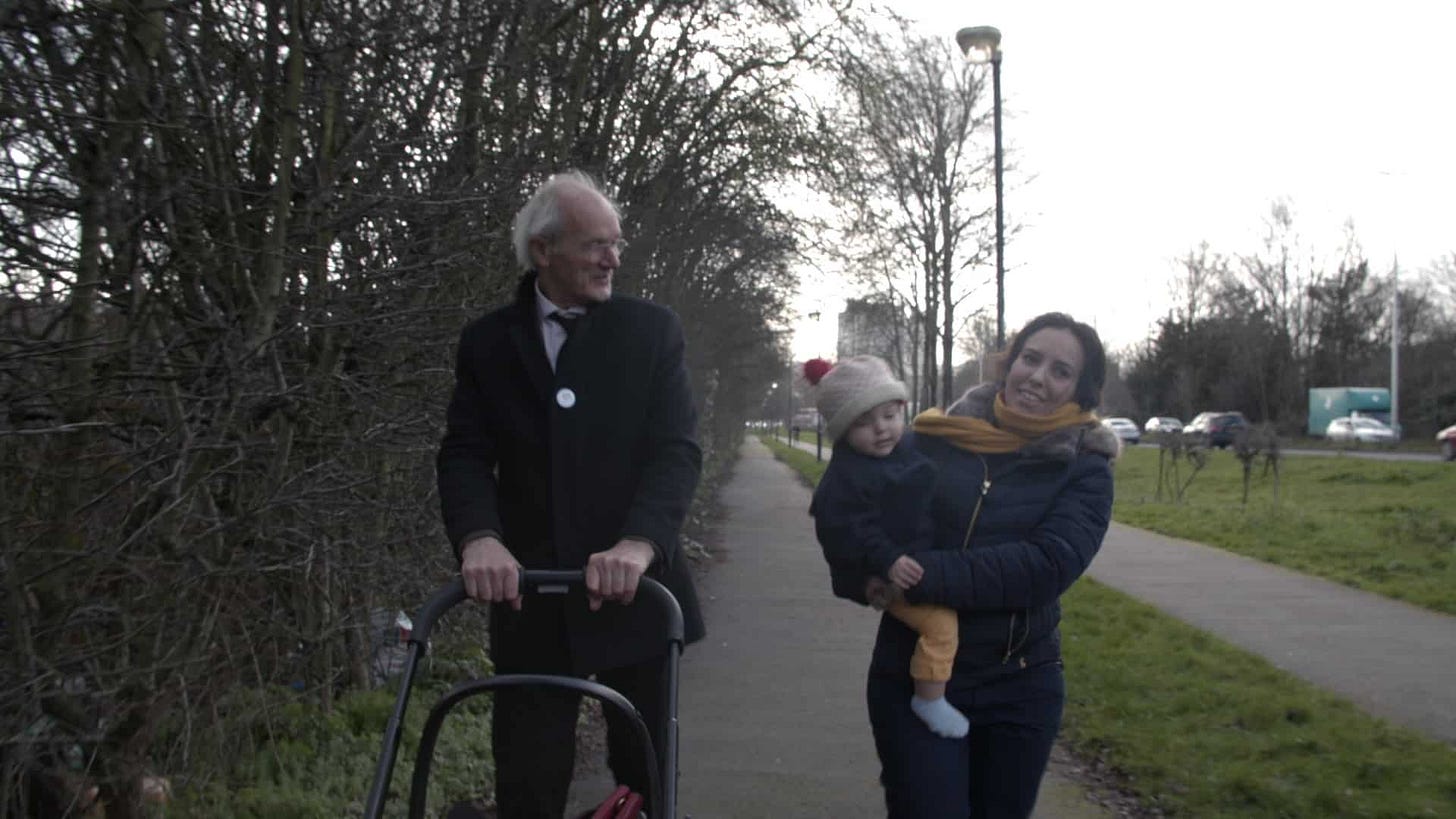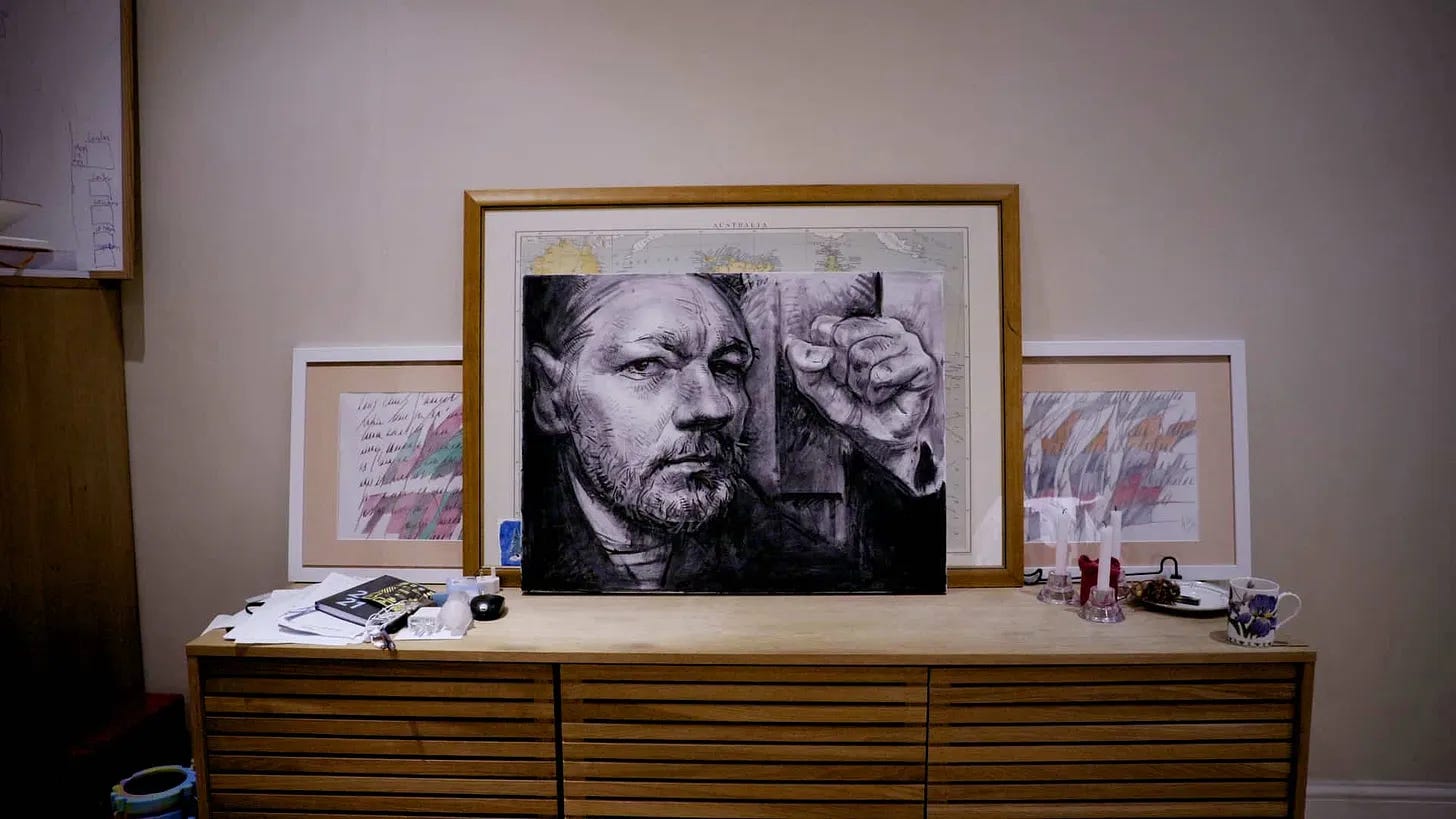👁🗨 Ithaka, le nouveau film pour la libération de Julian Assange
Julian Assange est le bouc émissaire, le Victor Jara à qui il faut briser les mains pour donner l’exemple, une nouvelle version de Prométhée comme le souligne son père, John Shipton.
👁🗨 Ithaka, le nouveau film pour la libération de Julian Assange
Par Olivier Azam, le 14 janvier 2024 - English version below
C’est une sortie CinéMutins, un nouveau documentaire important qu’on nous a confié pour la France : Ithaka, le combat pour la libération d’Assange de Ben Lawrence. Ce film, tout récent, reprend le fil du calvaire de Julian Assange là où l’avait laissé Hacking Justice de Clara Lopez-Rubio et Juan Pancorbo, que nous avions sorti en 2021. Ce nouveau documentaire est moins axé sur la procédure juridique qui arrive un peu au bout de tous les recours et se concentre sur le combat du père de Julian Assange (John Shipton) et de son épouse (Stella Assange), un combat quotidien pour le tenir en vie, parcourir le monde à la recherche de soutiens pour essayer d’élargir encore le cercle.
Le film de Ben Lawrence est très émouvant. Au-delà même de cette terrible injustice que vivent Julian Assange et sa famille, ses enfants qui grandissent sans leur père, les épreuves quotidienne pour Stella et John qui courent un marathon épuisant et parfois désespérant, pointe l’énorme contradiction de notre démocratie occidentale : Qui est le criminel dans cette affaire ? Où en est-on de notre soumission pour accepter un tel scandale sans broncher ? Qui peut se prétendre journaliste sans défendre la cause d’Assange ?
D’abord réfugié à l’ambassade d’Equateur à Londres puis dans une prison haute sécurité depuis quatre ans pour avoir publié la vérité, rien que la vérité, Julian Assange est le seul journaliste emprisonné pour ces révélations admises comme étant vraies (ce n’est pas leur vérité qui a été contestée, mais le fait d’informer les citoyens des horreurs faites en leur nom et en secret). Julian Assange est le bouc émissaire, le Victor Jara à qui il faut briser les mains pour donner l’exemple, une nouvelle version de Prométhée comme le souligne son père. Julian Assange survit dans des conditions indignes pour tout humain, quoi qu’il ait d’ailleurs fait. L’injustice est ici flagrante et nous renvoie un terrible miroir de nos démocraties occidentales aux fondations tellement fragiles. Après avoir vu ce film, impossible de rester de marbre. Comment supporter une telle injustice ? Mais avant tout, on comprend ici comment fonctionne le pouvoir et la nécessité absolue de s’organiser collectivement.
La procédure interminable et la torture psychologique que subit Julian Assange dans sa cellule sont déjà une lourde peine, avant même l’extradition (et un procès aux Etats-Unis où le journaliste transformé en espion risque l’absurde peine de 175 ans de prison), ne réside aujourd’hui que dans une vraie mobilisation comme on en a vu par le passé pour quelqu’un comme Nelson Mandela. Mais les temps ont changés, les héros sont consommés et l’attention plus difficile à capter. Pourtant l’enjeu est énorme. L’affaire Assange constitue un précédent sur l’ensemble de la liberté de la presse en occident, et atteint peu à peu d’autres journalistes qui investiguent sur le pouvoir et les affaires, un récent exemple étant l’affaire Ariane Lavrilleux de Disclose interpellée par le DGSI en septembre dernier pour avoir fait son travail (en savoir plus)... Quand on comprend ce qu’il se passe avec l’affaire Assange, on comprend que tous les journalistes qui “portent la plume dans la plaie”, tout simplement ceux qui osent encore enquêter sur des affaires mettant en porte à faux les pouvoirs politiques, les intérêts des milliardaires qui possèdent les grands médias sont ou seront touchés. Mais ce glissement va bien au-delà d’un problème de journalisme. Le débat universitaire, la liberté de créer dans l’art et la culture, dans l’éducation et l’enseignement, l’usage qu’on fait d’Internet, quelles règles communes devons-nous adopter pour survivre à la révolution technologique qui a balayé toutes nos certitudes d’antan...
... finalement l’ensemble de la société est déjà très touché par des censures diverses, plus ou moins insidieuses et qui ne sont pas forcément médiatisées, souvent même totalement inconnues du public, au-delà des intéressés qui ne peuvent même pas communiquer au risque d’aggraver encore la situation en s’auto-désignant comme des “moutons noirs”. C’est un cercle vicieux. Les conséquences des censures d’une pensée rationnelle comme celle de Julian Assange et d’informations solides comme celles de WikiLeaks, entrainent paradoxalement des “délires complotistes” [“puisqu’ils sont capable d’agir comme ça contre la vérité, pourquoi ne pas douter de tout ?”]. Seuls les travaux documentés et sérieux nous permettent de tenir le cap et de pas abandonner la contestation à une critique inopérante car fracturée collectivement et parasitée par des théories farfelues qui tiennent à distance des ralliements potentiels. L’enjeu est de taille... Modestement, les livres et les films contribuent à entretenir des contre-feux, à pousser “la fragile barque de la raison humaine qui flotte, de façon incertaine sur un océan de folie” comme disait le mathématicien et philosophe, activiste pacifiste, Bertrand Russell.
Nous avons constaté que le travail de fond de Stella Assange, John Shipton et leurs soutiens, peu à peu, agrègent des cercles de plus en plus larges. En France, des politiques, journalistes, influenceurs, sont de plus en plus au courant de l’affaire et certains s’engagent et la destruction organisée de l’image d’Assange pendant des années est peu à peu reconstruite à partir des faits. C’est un travail de fourmis, laborieux, parfois désespérant, mais il faut s’atteler à démonter la propagande avec une grande exigence intellectuelle et beaucoup de rigueur. Il faut donc bien s’informer soit-même pour continuer à informer le plus grand nombre, calmement, avec des outils solides. Ithaka, le combat pour libérer Assangeest un nouvel outil qui vient compléter et mettre à jour les quelques autres. Depuis Hacking-Justice, on ne peut plus se plaindre qu’il n’existe pas assez de supports en Français pour être informé de cette grande affaire de notre siècle, il faut juste s’interroger quand ils ne sont pas assez utilisés.
Olivier Azam, Les Mutins de Pangée.
Ithaka, the new film for the release of Julian Assange
By Olivier Azam, on January 14, 2024
It's a CinéMutins release, an important new documentary we've been entrusted with for France: Ben Lawrence's Ithaka, the fight to free Assange. This brand-new film picks up where Clara Lopez-Rubio and Juan Pancorbo's Hacking Justice, which we released in 2021, left off in Julian Assange's ordeal. This new documentary focuses less on the legal process, which has reached the end of its tether, and more on the struggle of Julian Assange's father (John Shipton) and his wife (Stella Assange) to keep him alive, travelling the world in search of support to try and widen the circle even further.
Ben Lawrence's film is very moving. Over and above the terrible injustice suffered by Julian Assange and his family, his children growing up without their father, the daily ordeals of Stella and John as they run an exhausting and sometimes despairing marathon, it points up the enormous contradiction in our Western democracy: who is the criminal in this affair? How submissive have we become to accept such a scandal without batting an eyelid? Who can claim to be a journalist without defending Assange's cause?
Taking refuge first in the Ecuadorian embassy in London, then in a high-security prison for the past four years for publishing the truth and nothing but the truth, Julian Assange is the only journalist imprisoned for his admittedly true revelations (it was not their truth that was contested, but the fact of informing citizens of the horrors that were being done in their name and in secret). Julian Assange is the scapegoat, the Victor Jara whose hands must be broken to set an example, a new version of Prometheus as his father points out. Julian Assange survives in conditions unworthy of any human, whatever he may have done. The injustice here is flagrant, and holds up a terrible mirror to our Western democracies, whose foundations are so fragile. After seeing this film, it's impossible to remain indifferent. How can you bear such injustice? Above all, we understand how power works, and the absolute necessity of collective organization.
The interminable proceedings and psychological torture suffered by Julian Assange in his cell are already a heavy penalty, even before extradition (and a trial in the USA where the journalist transformed into a spy faces the absurd sentence of 175 years in prison), and today lies only in a real mobilization like we've seen in the past for someone like Nelson Mandela. But times have changed, heroes are consumed and attention is harder to capture. Yet the stakes are enormous. The Assange affair sets a precedent for press freedom in the West as a whole, and is gradually reaching other journalists who investigate power and business, a recent example being the case of Ariane Lavrilleux of Disclose, questioned by the DGSI last September for doing her job (read more)... When we understand what's going on with the Assange affair, we understand that all journalists who “carry the pen in the wound”, quite simply those who still dare to investigate matters that challenge the political powers and the interests of the billionaires who own the major media, are or will be affected. But this shift goes far beyond a problem of journalism. Academic debate, the freedom to create in art and culture, in education and teaching, the use we make of the Internet, what common rules we need to adopt to survive the technological revolution that has swept away all our former certainties...
... in the end, the whole of society is already very much affected by various forms of censorship, more or less insidious, which are not necessarily publicized in the media, and are often even totally unknown to the public, beyond those concerned who can't even communicate, at the risk of making the situation even worse by designating themselves as “black sheep”. It's a vicious circle. The consequences of censoring rational thought like that of Julian Assange, and solid information like that of WikiLeaks, paradoxically lead to “conspiracy delusions” [“since they're able to act like that against the truth, why shouldn't we doubt everything?”]. Only serious, well-documented work will enable us to stay the course, and not abandon our contestation to a critique that is inoperative because it is collectively fractured and parasitized by far-fetched theories that keep potential rallies at bay. The stakes are high... Modestly, books and films help to keep the fires burning, to push “the fragile boat of human reason, which floats uncertainly on an ocean of madness”, as the mathematician, philosopher and pacifist activist Bertrand Russell put it.
We have seen that the ground-breaking work of Stella Assange, John Shipton and their supporters is gradually attracting wider and wider circles. In France, politicians, journalists and influencers are increasingly aware of the affair, and some are getting involved. The organized destruction of Assange's image over the years is gradually being reconstructed on the basis of the facts. It's a painstaking, laborious and sometimes desperate task, but it's one that requires a great deal of intellectual rigor and rigor to dismantle the propaganda. You need to be well-informed yourself if you are to continue to inform as many people as possible, calmly and with solid tools. Ithaka, the fight to free Assange is a new tool that complements and updates the others. Since Hacking-Justice, we can no longer complain that there aren't enough media in French to keep us informed about this major issue of our century, we just have to wonder when they aren't used enough.
Olivier Azam, Les Mutins de Pangée.







